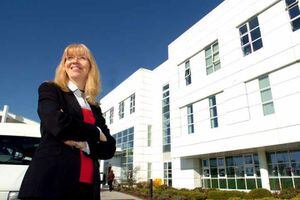Dudley's Russells Hall Hospital boss remains positive despite review demanding improvements
The chief executive at Russells Hall Hospital say she remains positive about its future despite a far-reaching review by a health watchdog which has demanded improvements.

The Care Quality Commission (CQC) looked into the hospital and met up with patient, carers and workers as part of its inspection carried out in March this year.
While it rated three categories of the hospital to be 'good', the inspectors said two areas - safety and responsiveness - required improvement.
Overall, the hospital trust was told to improve and was given a list of demands including reviewing patient flow and ensuring staffing levels were satisfactory.
But chief executive Paula Clark said she was pleased with the inspectors' confidence the wanted improvements were 'within the grasp' of the trust.
She also praised the hard work of staff, who were endorsed by patients when interviewed by inspectors for 'going the extra mile'.
She said: "It is disappointing we haven't quite tipped over the line into good.
"I think we were on the cusp of being rated as good and if we had tipped over it would have been fantastic for the staff and a real boost for them.
"But we haven't quite made it this time. We recognise we can always do better."
In a summary of the report, the CQC marked the hospital trust 'good' in categories for being effective, caring and well-led.
Under the category for safety, the inspectors said there had been 168 'serious incidents' between December 2012 and January this year, plus two 'never events' - instances which should not occur.
They found all the areas visited were clean and hygienic, and protected patients from hospital infections.
However, inspectors saw problems in the accident and emergency department, where they found space was an issue, with patients left waiting in corridors 'on a number of occasions'.
It also found staff were working under significant pressure, and that not all staff understood the importance of incident-reporting.
Finally under safety, the report found the medial high dependency unit was 'routinely' understaffed. The unit has 10 beds, with six always used by high dependency patients. The remaining four can used by other patients.
Ms Clark said: "We have talked to the CQC about that (high dependency unit), it is true to say that we are reliant on the good will of our staff and temporary staff, but we do always make sure we have the right ratio staff on there."
"All high dependency patients do have the right amount of patients, which is one to two."
The report found the trust was effective and caring.
New data showed the mortality rate had reduced thanks to 'strong leadership' by the medical director.
The number of births had been limited to under 5,000 a year to help bosses manage the trust.
Many areas of the trust were found to have 'good practice and audit', and inspectors saw a good use of clinical guidelines and training.
Speaking to patients, the inspectors said many were 'highly positive' of the care they had received and staff had been praised for being committed.
Ms Clark said: "It says the staff we have got are fantastic, there is something about the staff being committed to the community and job they do. It's a hard job, the front line staff do, but the way they continue to show that empathy and care is a testament to what great staff we have got."
Like safety, the hospital was told to improve areas in responsiveness.
Inspectors said they could not be assured services did not always meet patient needs.
They said that the trust regularly breached its four-hour waiting target.
Last month it was revealed more than 1,000 people waited at least four hours in 13 weeks up to the end of September - but this was within the NHS target.
Ms Clark said the hospital was on course to stay within accident and emergency waiting targets for this annual quarter.
An ambulatory emergency care station has also been set up in the hospital to filter patients who need a bed at the accident and emergency department.
A walk-in centre will be built at the hospital, which is aimed at relieving strain on the emergency department.
Inspectors also found delays in the flow of patients through the hospital between wards, and then patients not being located in appropriate wards due to bed shortages.
The hospital has since reorganised wards in a bid to speed up the process.
Since last November it has also offered an Ambulatory Emergency Care, which aims to see, treat and discharge people on the same day and reduce overnight stays and create bed space for those patients who need a bed.
The hospital say the care has saves 1,356 'bed days' a year.
Patients told the inspectors of problems with car parking at the hospital, they said it caused 'much stress'.
Ms Clark said: "At times it is a problem here, we would admit that."
She said the hospital was rolling out free parking for cancer patients as well as extending a discount car for relatives of patients who attend frequently for short-stay.
The hospital is also in talks with Dudley Council about creating an additional car park at the rear of the site.
Finally, under the category on leadership, the trust was rated as 'good'.
The report was done by an inspection team led by Tim Cooper, head of hospital inspection at the CQC.
It said the trust must ensure staffing levels and cover for vacant shifts was satisfactory.
The CQC's report was a follow-up review to review by Sir Bruce Keogh last year.





